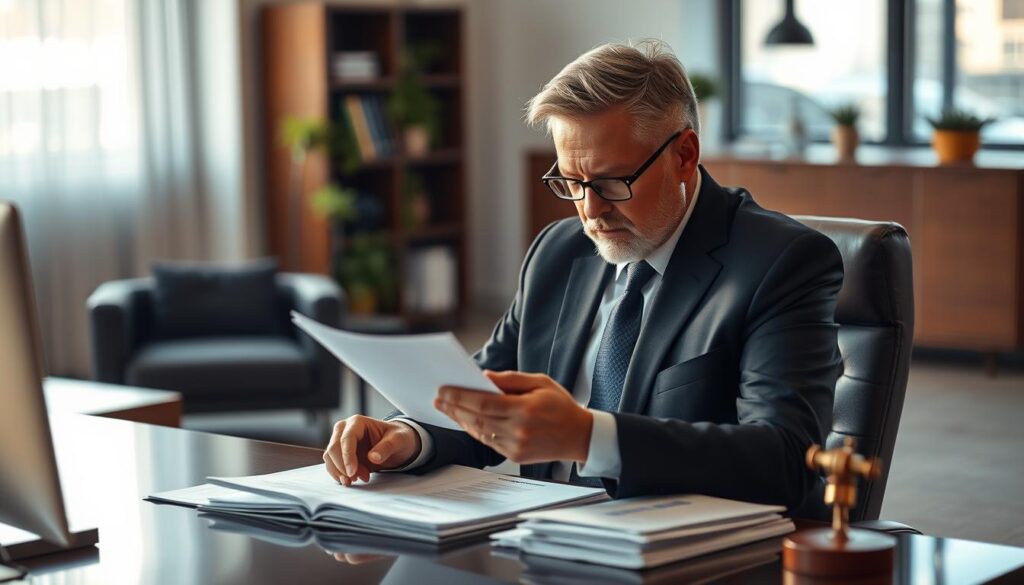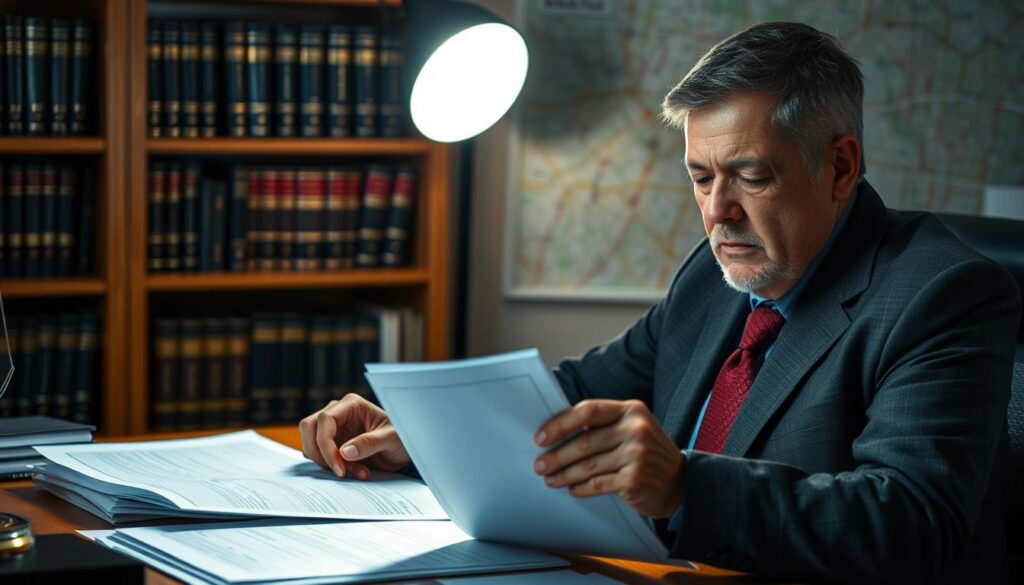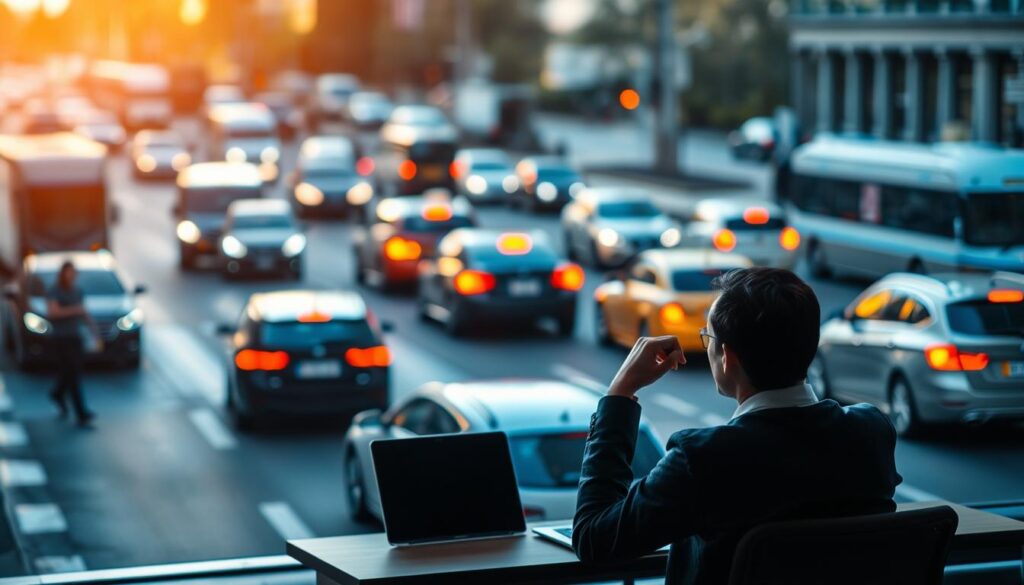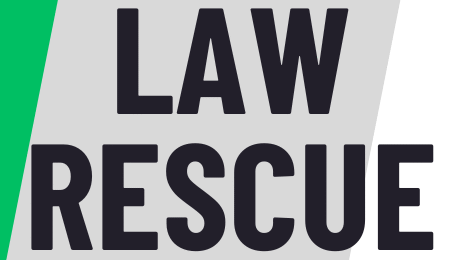Ever thought about beating that unwanted traffic ticket? It really depends on picking the right traffic law specialist for your case.
Getting a traffic ticket can be really stressful. But, knowing how to pick the right legal advice can change everything.
Choosing a specialist who knows traffic laws well is crucial. In this article, we’ll show you how to pick the best lawyer for your case.
Why You Need a Traffic Lawyer for Your Ticket Defense
Getting a ticket can have serious effects. You might face fines, higher insurance costs, and points on your license. Knowing the impact of traffic violations is key to defending yourself.
The Real Consequences of Traffic Violations
Traffic tickets can cause many problems. They can raise your insurance rates, lead to a suspended license, and increase fines. A bad driving record can limit your driving rights for a long time. A traffic lawyer can help lessen these effects.
How Legal Representation Improves Case Outcomes
Having a lawyer can greatly improve your case’s outcome. They understand traffic laws well and can talk to the court for you. This can lead to lower charges or even dismissals. Their knowledge is crucial in dealing with traffic court.
Statistical Success Rates with Representation
| Outcome | With Representation | Without Representation |
|---|---|---|
| Charges Dismissed | 35% | 10% |
| Reduced Charges | 45% | 20% |
| Fines Reduced | 50% | 25% |
The table shows that a traffic lawyer can greatly boost your chances of a good outcome. They can represent you in court, aiming for better results. This could mean getting charges dropped or reduced.
When Hiring a Traffic Lawyer Becomes Essential
Knowing when to get a traffic lawyer can greatly affect your case’s outcome. Some situations need a lawyer’s help to deal with traffic laws and keep your driving rights.
Serious Moving Violations That Require Legal Help
Big moving violations, like reckless driving or speeding, can cause big fines and even lose your license. A traffic lawyer can lessen these effects by questioning the evidence or finding a better plea deal.
Multiple Offenses and Their Cumulative Impact
Getting many traffic tickets can mean bigger fines, higher insurance, and possibly losing your license. A traffic lawyer can handle these issues by fighting the charges or finding other solutions like traffic school.
Commercial Driver’s License Considerations
For those with a commercial driver’s license (CDL), the risks are even greater. A traffic ticket can threaten your job as a driver because of stricter rules and penalties for CDL holders.
Professional Driving Career Protection
| Violation Type | Potential Consequence | Legal Help Benefit |
|---|---|---|
| Serious Moving Violations | License Suspension | Defense against suspension |
| Multiple Offenses | Increased Insurance Rates | Reduction in charges or penalties |
| CDL Violations | Career Impact | Protection of CDL privileges |
Getting a traffic lawyer can help CDL holders protect their jobs from the harm of traffic tickets.
10 Tips Before Choosing the Right Personal Injury Attorney
Key Benefits of Professional Legal Representation
Getting help from a lawyer is key when facing traffic tickets. They can help lower your charges or even get them dropped. An experienced attorney knows the ins and outs of traffic laws and can fight for a better outcome for you.
Strategies for Charge Reduction or Dismissal
A good traffic lawyer has many tricks up their sleeve. They might question the evidence, talk to the prosecutor, or spot mistakes in the ticket. These moves can help lower or wipe out your charges.
Protecting Your Driving Record from Points
Points on your driving record can raise your insurance and even lead to losing your license. A traffic lawyer can work to keep your record clean. This way, you avoid higher insurance costs and losing your license.
Long-term Insurance Premium Protection
Traffic tickets can really hurt your insurance rates. A professional traffic lawyer can help keep your rates low. This is a big advantage in the long run.
Cost-Benefit Analysis of Legal Fees vs. Premium Increases
It might seem like hiring a lawyer costs a lot. But think about the money you’ll save in the long run. Here’s a comparison:
| Scenario | Legal Fees | Premium Increases | Total Cost |
|---|---|---|---|
| Without Lawyer | $0 | $1,500/year | $6,000 (over 4 years) |
| With Lawyer | $500 | $0 | $500 |
As shown in the table, hiring a traffic lawyer can result in significant long-term savings.
By choosing a professional traffic lawyer, you protect your rights. You also get a better chance at a positive outcome in your case.
Common Traffic Violations a Lawyer Can Successfully Defend
A traffic lawyer can help you with many traffic violations. This can save you from big fines and higher insurance costs. Violations include speeding, DUI/DWI, and reckless driving.
Speeding Ticket Defense Strategies
Speeding tickets are very common. A lawyer can question how fast you were going or the officer’s methods. They might also try to lower the fine or get the ticket thrown out if there were mistakes.
Red Light and Stop Sign Violation Defenses
Red light and stop sign tickets often use camera evidence. A good lawyer will check if the cameras worked right. They might also say the signs were bad or there were special reasons.
DUI/DWI Representation Approaches
Defending DUI/DWI charges needs a lot of legal knowledge. A lawyer will look at the breathalyzer and field sobriety tests. They can question if these tests were accurate and if the arrest was done right.
Reckless Driving and Careless Driving Defenses
Charges for reckless or careless driving can hurt your driving record and insurance. A lawyer can say your driving was not as bad as charged. They might also point out things you couldn’t control.
| Violation Type | Common Defenses | Potential Outcomes |
|---|---|---|
| Speeding Ticket | Challenge speed measurement accuracy, question officer observation | Fine reduction, ticket dismissal |
| Red Light/Stop Sign | Scrutinize camera evidence, argue signage inadequacy | Charge reduction, dismissal |
| DUI/DWI | Challenge breathalyzer and field sobriety test reliability | Charge reduction, case dismissal |
| Reckless/Careless Driving | Argue behavior was not reckless, mitigating circumstances | Charge reduction, lesser penalties |
Knowing the defenses for common traffic violations helps you work with a skilled lawyer. This way, you can better face the legal system.
Essential Qualities of an Effective Traffic Lawyer
Choosing the right traffic lawyer is key to defending your rights and reducing penalties. A good traffic lawyer can greatly change your case’s outcome. It’s important to know what makes a lawyer stand out.
Specialized Experience in Traffic Court
A lawyer with traffic court experience knows the law well. They can move through the court system smoothly. Look for someone with a history of winning cases like yours.
Local Court Knowledge and Relationships
Knowing the local courts and officials can help your case. A local lawyer is familiar with judges and prosecutors. This can lead to better results for you.
Clear Communication and Case Updates
Good communication is crucial. Your lawyer should keep you updated and answer your questions. This keeps you informed and less worried.
Client Responsiveness Indicators
- Prompt response to initial inquiries
- Regular case updates
- Clear explanation of legal strategies and potential outcomes
| Quality | Description | Benefit |
|---|---|---|
| Specialized Experience | Proven track record in traffic law | Better case handling |
| Local Court Knowledge | Familiarity with local court procedures and officials | More favorable outcomes |
| Clear Communication | Regular updates and availability | Reduced client anxiety |
By looking for these qualities, you can find a lawyer who will handle your case well.
How to Thoroughly Research Potential Traffic Lawyers
Looking for the right traffic lawyer is key to a good outcome. With many lawyers out there, it’s hard to know where to begin.
Evaluating Online Reviews and the Success Stories
Start by checking online reviews and success stories. Sites like Avvo, Martindale-Hubbell, and Google Reviews offer insights. Look for lawyers with high ratings and read reviews to learn about their strengths and weaknesses.
For example, a lawyer with a 4.5-star rating on Avvo and many positive Google Reviews is a strong candidate. Check the cases they’ve handled and their results.

Utilizing Bar Association Resources and Ratings
Your local or state bar association is also a great resource. They provide ratings, reviews, and disciplinary history. The American Bar Association (ABA) offers help in finding a qualified lawyer.
| Bar Association Resource | Description | Benefits |
|---|---|---|
| Local Bar Association | Provides local lawyer directories and ratings | Helps find lawyers familiar with local courts |
| State Bar Association | Offers state-wide lawyer directories and disciplinary records | Ensures the lawyer is licensed and in good standing |
| American Bar Association (ABA) | National organization providing lawyer resources and ratings | Offers a broader perspective on a lawyer’s qualifications |
Getting Qualified Referrals from Trusted Sources
Referrals from people you trust, like friends or other lawyers, are very helpful. They share their real experiences with a lawyer’s skills and work ethic.
Questions to Ask When Seeking Referrals
- What was your experience with the lawyer?
- How did the lawyer communicate with you?
- Were you satisfied with the outcome of your case?
- Would you recommend the lawyer to others?
By researching online, using bar association resources, and asking for referrals, you can find a qualified attorney. They will help you with your traffic ticket case.
Critical Questions to Ask During Lawyer Consultations
When you meet with a traffic lawyer, it’s key to ask the right questions. This first meeting lets you see if the lawyer knows their stuff and if they’re right for your case.
Case-Specific Experience and Outcomes
Find out if the lawyer has handled cases like yours before. Ask about their success in fighting license suspension cases. Knowing their success rate can tell you a lot about their skill in giving legal advice.
Defense Strategy and Success Probability
A good traffic lawyer should have a clear plan for your case. They should explain their strategy and how they aim to get a good result. They should also give you a fair idea of your case’s chances of winning.
Comprehensive Fee Structure Discussion
It’s important to know how much the lawyer will cost. Ask them to explain their fees and what you’ll get for your money.
Understanding What’s Included in Representation
Make sure you know what the lawyer’s fees cover. This might include:
- Initial consultation
- Case review and analysis
- Court representation
- Communication with prosecutors
- Negotiation of plea deals or charge reduction
By asking the right questions, you can choose a traffic lawyer who will fight for you well.
Understanding Traffic Lawyer Fee Structures
Dealing with traffic court can be tough, and knowing the legal fees is key. The cost of a traffic lawyer is a big worry when you face traffic violations.
Flat Fee vs. Hourly Rate Considerations
Traffic lawyers charge in two main ways: flat fee or hourly rate. A flat fee means you pay one price for all work on your case. Hourly rates, on the other hand, can make costs unpredictable because you pay for each hour worked.
| Fee Structure | Pros | Cons |
|---|---|---|
| Flat Fee | Predictable costs, comprehensive coverage | May be higher upfront, non-refundable |
| Hourly Rate | Potential for lower total cost if case resolves quickly | Unpredictable total cost, potential for high bills |
Court Costs and Additional Expenses
There are costs beyond the lawyer’s fee. You might need to pay for court costs, filing fees, and records or expert testimony. Knowing these costs helps you plan your defense budget.
Payment Options and Financing Possibilities
Some lawyers offer payment plans or financing to help with costs. It’s important to talk about these options during your first meeting. This way, you can find the best payment plan for you.
Understanding different fee structures and costs helps you choose the right traffic lawyer. This way, you can defend yourself in court confidently.
Local Knowledge vs. Specialized Traffic Lawyer Expertise
When you get a traffic ticket, it’s key to find a balance. You need a lawyer who knows the local courts well and is an expert in traffic law. This mix can greatly help your case.
Advantages of Local Court Familiarity
A lawyer who knows the local courts can offer big advantages. They understand the court’s rules and what the judges like. This knowledge helps them move through the system smoothly.
- Understanding the local court’s specific rules and regulations
- Knowing the judges’ and prosecutors’ preferences and tendencies
- Navigating the court system efficiently
Benefits of Traffic Law Specialization
A traffic law specialist knows all about traffic rules. They have a deep understanding of the law. This expertise can greatly benefit your case.
| Specialization Benefits | Description |
|---|---|
| Expertise in Traffic Regulations | A deep understanding of traffic laws and regulations, enhancing your defense |
| Experience with Similar Cases | A proven track record of handling cases similar to yours, improving the chances of a favorable outcome |
| Staying Updated on Law Changes | Awareness of the latest changes in traffic laws, ensuring your defense is always relevant |
Finding the Right Balance for Your Case
To get the best results, you need a lawyer who knows both local courts and traffic law. Look for someone with a strong local presence and traffic law expertise. This mix will give you the best chance at winning your case.

Why You Should Choose a Dedicated Traffic Lawyer
Choosing a dedicated traffic lawyer can save your driving privileges. Traffic tickets are more than just fines. They affect your driving rights and insurance costs.
Limitations of General Practice Attorneys
General practice attorneys deal with many legal issues. But, they might not know much about traffic law. This lack of knowledge can hurt your case.
Specialized Knowledge of Traffic Code Nuances
Dedicated traffic lawyers know traffic law inside out. They understand local traffic rules well. This helps them build a strong defense for you.
Established Relationships with Prosecutors and Judges
Dedicated traffic lawyers also have good connections in court. They know the judges and prosecutors well. This can help them get better results for you.
| Benefits | General Practice Attorneys | Dedicated Traffic Lawyers |
|---|---|---|
| Specialized Knowledge | Limited | Extensive |
| Court Relationships | Few | Established |
| Case Outcome | Variable | Favorable |
Choosing a dedicated traffic lawyer means your case is in good hands. They have the skills and connections to get you the best outcome. This could save you from a license suspension.
Red Flags When Selecting a Traffic Attorney
When looking for a traffic attorney, watch out for warning signs. These signs can mean you’re not getting the best lawyer. Knowing these red flags is key to picking a good attorney.
Guaranteed Outcomes and Unrealistic Promises
One big warning is when an attorney promises a win or makes big claims. No lawyer can promise a win because every case is different. Be careful of those who say they can win your case easily or dismiss charges without a good plan.
Communication Issues and Responsiveness Problems
Good communication is essential in a lawyer-client relationship. If your lawyer doesn’t answer calls or emails, or keeps you in the dark, it’s a bad sign. You need a lawyer who talks to you and keeps you informed.
Vague or Constantly Changing Fee Structures
Be careful of lawyers with unclear or changing fees. You should know how much you’ll pay upfront. If fees are unclear or keep changing, it might mean the lawyer is not honest.
How to Verify an Attorney’s Reputation
To check a lawyer’s reputation, look at online reviews and ask for referrals. Also, check their standing with the state bar association. A good attorney will have a strong reputation and give you legal advice that helps you.
By knowing these red flags and checking a lawyer’s reputation, you can choose the right traffic attorney for you.
Preparing Effectively for Your Initial Legal Consultation
Before you meet with a traffic lawyer, it’s key to prepare well. This will help your lawyer build a strong defense for your case. You’ll want to give them all the info they need.
Essential Documentation to Bring
Having the right documents is important for a good consultation. Make sure to bring:
- Your traffic ticket or citation
- Any letters or emails about your case
- Your driving record
- Photos or videos that matter to your case
- Witness statements, if you have them
| Document Type | Description | Importance |
|---|---|---|
| Traffic Ticket | The original citation issued to you | High |
| Driving Record | Your official driving history | Medium |
| Photos/Videos | Visual evidence related to your case | High |
| Witness Statements | Written testimony from witnesses | Medium |
Detailed Questions to Ask About Your Specific Case
To get a clear picture of your lawyer’s plan, ask these questions:
- What experience do you have with cases like mine?
- What are the possible results for my case?
- How will you keep me updated?
Setting Clear Expectations for Representation
Make sure you know what your lawyer will do for you. Talk about:
- How often you’ll hear from them
- What their defense strategy is
- What you’ll pay and how
Being ready for your first meeting with a traffic lawyer sets a solid base for your case. It helps you and your lawyer work together to get the best result.
Building a Productive Relationship With Your Traffic Lawyer
To get the best results, it’s key to have a good relationship with your traffic lawyer. This partnership is vital for a strong speeding ticket defense and legal representation.
Providing Complete and Honest Case Information
Your lawyer needs all the facts to defend you well. This means sharing details about the incident, any past traffic issues, and other important facts.
- Details of the traffic stop or incident
- Any previous traffic violations or convictions
- Relevant background information that may impact your case
Following Legal Advice and Instructions
After hiring a lawyer, it’s important to follow their advice. This helps you take the right steps to defend your case.
Your lawyer might tell you how to act in court, what to share, and how to answer questions from the prosecution.
Establishing Effective Communication Channels
Good communication is essential for a strong lawyer-client relationship. Make sure you know how to contact your lawyer and what to expect about your case updates.
When to Contact Your Attorney vs. When to Wait
Knowing when to call your lawyer is important. Contact them if you have new case information, receive court or prosecution messages, or have questions about your case.
| Communication Method | Best Use | Response Time |
|---|---|---|
| Non-urgent inquiries, document sharing | Within 24 hours | |
| Phone | Urgent matters, detailed discussions | Same day or next business day |
| In-person meeting | Complex issues, court preparation | By appointment |
By following these tips and keeping communication open, you can build a strong relationship with your traffic lawyer. This will help improve your chances of a good outcome in your case.
The Traffic Court Process: What to Expect
Understanding the traffic court process helps you prepare for what’s ahead. It’s key to know what to expect when facing a traffic ticket. This ensures you’re well-prepared for your case.
Typical Timeline from Citation to Resolution
The time from getting a citation to resolving your case varies. It depends on the court’s schedule and your case’s complexity. You’ll usually get a court date, which can be weeks or months away.
Here’s a general outline of what you might expect:
| Step | Description | Timeline |
|---|---|---|
| Citation | Receiving the traffic ticket | Immediate |
| Court Date | Scheduled court appearance | Several weeks to months |
| Pre-Trial | Preparation and potential negotiations | Before the court date |
| Trial | Court hearing | Court date |
| Resolution | Outcome of the case | After the trial |
Court Appearance Requirements and Preparation
Court appearance requirements vary, but being prepared is crucial. You’ll need to dress appropriately, arrive early, and be ready to present your case. Bring all relevant documents, like your citation, driver’s license, and any evidence supporting your case.
Preparation is key to a successful court appearance. Consider consulting with a traffic law specialist to ensure you’re well-prepared.
Potential Outcomes and Negotiation Points
The potential outcomes of your case can vary. They range from a dismissal to a conviction, with various possibilities in between. Understanding these outcomes and negotiation points can help you navigate the process more effectively.
Negotiation points may include:
- Reducing the charges
- Minimizing penalties
- Avoiding license suspension
Post-Resolution Steps and Follow-Up
After your case is resolved, there are several steps you may need to take. If you’ve been convicted, you may need to pay fines or complete a driving course. If your case was dismissed, you may be eligible to have the citation expunged from your record.
When to Consider Alternatives to Hiring a Traffic Lawyer
Hiring a traffic lawyer is often the best choice. But, there are times when other options might be better. This depends on the type of traffic violation, your driving history, and the possible outcomes.

Traffic School and Diversion Program Options
For small infractions, traffic school or a diversion program could be a good choice. These options let you take a defensive driving course or do community service. This way, you might avoid the cost of a lawyer and keep points off your record.
Self-Representation Pros and Cons
Choosing to represent yourself in court is another option. It can save you money on legal fees. But, it takes a lot of time and effort to get ready for court. You need to know the traffic laws and court rules well.
Self-representation might be cheaper, but it’s not always the best choice. It’s not ideal for serious cases or if you’re not sure about the legal process.
Minor Violations vs. Serious Offenses
The seriousness of the offense is key in deciding what to do. For small issues, like a first-time speeding ticket, traffic school might be enough. But, for serious crimes like DUI/DWI or reckless driving, getting a lawyer is usually a better idea.
A lawyer can give you advice based on your specific case. This could lead to better results.
Conclusion
Choosing the right traffic lawyer is key to a good outcome in your case. We’ve talked about why legal help is important for traffic issues. This includes understanding the effects of traffic fines and dealing with traffic court.
By picking a traffic lawyer who knows the local courts well, you can do better in your case. A good lawyer can help lower or even drop charges. This protects your driving record and keeps your insurance costs down.
As we’ve seen, a skilled traffic lawyer can really change your case. Follow the tips in this article to find the best lawyer for your traffic problems. This way, you’ll get the best result possible.

